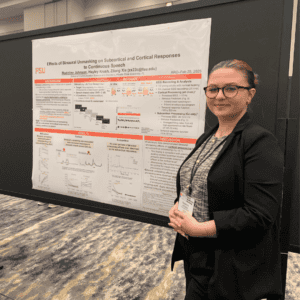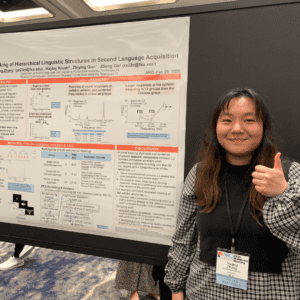School of Communication Science and Disorders (SCSD) Assistant Professor and researcher, Zilong Xie, presented his latest findings on auditory neuroscience at the Association for Research in Otolaryngology (ARO) 48th Annual Midwinter Meeting, taking place in Orlando from February 22-26.
Xie’s work explores how the brain processes speech in various real-world situations, with a focus on aging, hearing loss, and second language acquisition. His research utilizes cognitive neuroscience tools, including psychophysics, electroencephalography (EEG), and machine learning to investigate how individuals comprehend speech under different conditions. Xie’s findings hold significant implications for improving speech understanding among older adults, individuals with hearing loss, and nonnative speakers.

At the conference, Xie delivered a podium presentation titled, “Subcortical Responses to Continuous Speech under Crossmodal Divided Attention.” This study examines how people process speech while multitasking, such as listening to the radio while driving. The research reveals that early stages of speech processing remain strong in these situations, suggesting that difficulties in comprehension arise at later cognitive processing stages.
In addition to his podium presentation, Xie’s lab showcased two poster presentations. The first, “The Effects of Binaural Unmasking on Subcortical and Cortical Responses to Continuous Speech,” led by undergraduate researcher Madeline Johnson, explores how the brain isolates important sounds from background noise.
The second poster, “Neural Tracking of Hierarchical Linguistic Structures in Second Language Acquisition,” presented by graduate research assistant Yuqing Zhang, investigates how second language learners of Chinese process linguistic structures at various levels and aims to develop neural biomarkers for language proficiency.

Xie acknowledges the challenges his team faced in setting up experiments and data analysis pipelines but credits the research community for valuable support, emphasizing the importance of studying multiple stages of speech processing simultaneously and incorporating real-life scenarios, such as listening to engaging, natural speech signals (e.g., stories), to advance the field.
His work is expected to contribute to developing clinical strategies for improving speech comprehension in diverse populations. As Xie and his team continue to push the boundaries of auditory science, their research holds promise for transforming speech perception and communication for many individuals worldwide.

